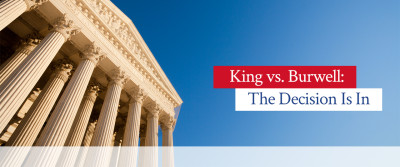The Supreme Court Hands Down a Major Victory for People with Disabilities
by Randall Rutta, President and CEO
The U. S. Supreme Court’s historic ruling upholding affordable care subsidies is an enormous win for people with disabilities.
Had the plaintiffs in King v. Burwell prevailed, as many as 6.4 million Americans would have been in danger of losing the federal tax credits they need to pay insurance premiums under the Patient Protection and Affordable Care Act (ACA). Of vital importance is the fact that of those eligible for assistance — individuals and families with incomes between 100 and 400 percent of the federal poverty level – many are people living with disabilities.
According to a 2014 Senate report, over 28 percent of non-institutionalized adults aged 21-64 with a disability in the United States live in poverty compared to 12.4 percent of those without a disability, more than any other demographic measured. The report also found that American households with an adult member with a disability earn 38.4 percent less than households without an adult with a disability.
But these figures only hint at the importance of the tax credits to those with disabilities who need them. In our Easter Seals communities, where we serve individuals with disabilities and the families that care for them, we see daily the difference affordable healthcare makes. For many, access to medical services and products, including rehabilitative and occupational therapies, is the only way they can hope to achieve and maintain independence and employment.
The welfare of so many depends on the survival of the ACA, and this latest legal challenge was a true cliffhanger, turning on the court’s interpretation of a few words of statutory language.
In King, the petitioners argued that the Act only allows tax credits for healthcare plans bought in a market, or exchange, set up and run by a state. The problem is that when a state declines to set up an exchange, the law requires the federal government to step in and operate a federal exchange in that state. The petitioners argued that the language of the law precluded tax credits in these states. The court viewed the ambiguous language in the context of the whole Act and, in a 6-3 ruling, found that the federal tax credits applied to both state and federal exchanges.
The majority opinion noted that “state and federal exchanges would differ in a fundamental way if tax credits were available only on state exchanges—one type of exchange would help make insurance more affordable by providing billions of dollars to the states’ citizens; the other type of exchange would not.” The Court further found that such a distinction “would destabilize the individual insurance market in any state with a federal exchange, and likely create the very ‘death spirals’ that Congress designed the Act to avoid.”
The Supreme Court may have been speaking to the specific legal issue in King, but the words of the justices have particular and powerful resonance for those living with disabilities. Access to affordable healthcare is integral to lives filled with promise and potential. Ensuring that those who need it, wherever they live, have access to federal subsidies is the fundamental essence of the law. Put another way, every challenge to the ACA is a challenge to the health, functionality and independence of those with disabilities. Let’s hope King marks an end to it.
Visit easterseals.com/advocacy to stay on top of breaking news from Capitol Hill and to find ways to have your voice heard in Washington D.C.







